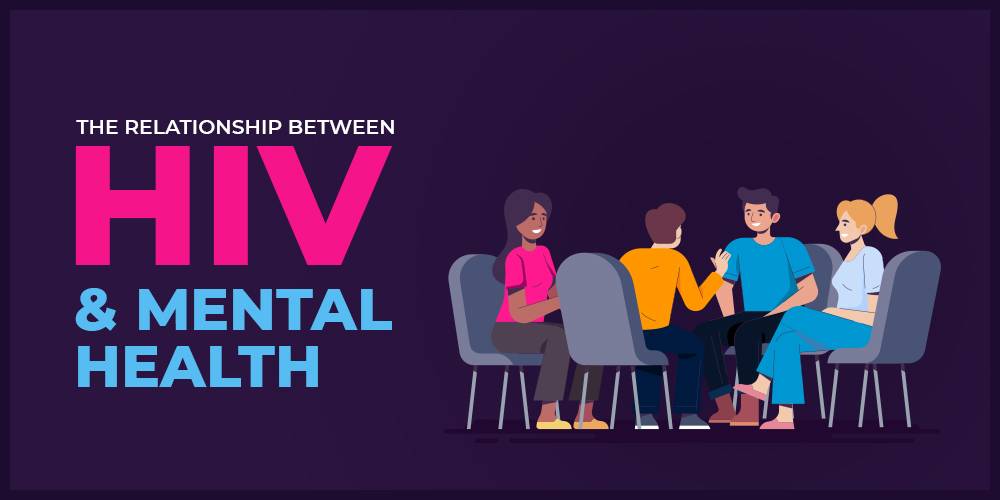There are so many misconceptions regarding HIV and AIDS. Sadly, there is still so much discrimination towards people living with HIV, often due to a lack of education about what HIV really is. One of the most common misunderstandings is of course that HIV can prevent a person from living a healthy life.
HIV medication helps to suppress the virus so it is unable to replicate and therefore it also cannot be transmitted to another person. This helps to suppress many of the symptoms of HIV and allows people to go on to live totally healthy, normal lives.
However, the stigma of the disease, as well as the stress of medical care, can lead to mental health troubles. According to the latest research, one in five adults in the US experience mental health disorders, and over 50% of people will be diagnosed with a mental disorder or illness at some point in their life.
But it is alarming to note that there is a distinct relationship between HIV and mental health. So, let’s discuss how HIV and mental health are connected and what people living with HIV, as well as their support group, can do about it.
Are People Living with HIV at a Higher Risk for Mental Health Issues?
While mental health issues are more common than ever across all demographics. But sadly, for people living with HIV, mental health issues are even more prevalent. Some reports estimate that about people living with HIV are two to five times more likely to struggle with mental health illnesses.
Now, it is important to understand what a mental health disorder is and how mental health affects a person’s life. There are many categories of mental disorders, including depression, anxiety and panic disorder, post-traumatic stress, and mood disorders.
Often, people will develop these mental health conditions after a traumatic event. Being diagnosed with HIV could trigger this, as well as any other trauma, such as sexual assault, major life changes, or increased stress. The latest scientific study determined that over one-third of people who were HIV positive were also diagnosed with depression and 16% have a generalized anxiety disorder.
Sadly, there is also the shame that many people feel due to the stigma surrounding HIV. They may not feel like they can talk about their issues with friends and family, leading to a loss of social support. This feeling of isolation and disconnection is one of the main reasons why HIV and mental health are so closely linked.
Can HIV Cause Depression, Stress, and Mental Disorder?
Since rates for mental health issues are so much higher amongst people living with HIV, some have wondered, ‘can HIV cause depression and mental disorders?’
The answer here is no – HIV does not directly cause any mental health problems. Most mental health illnesses, such as depression and bipolar disorder, are caused by a chemical and hormonal imbalance in the brain. These may be a result of many things, such as trauma or even genetics.
HIV does not interfere with these types of hormones, but the stress from the situation can cause or worsen these mental health issues. However, there is some evidence that Antiretroviral Therapy which is used to suppress the viral load can have some neurological side effects. However, these are quite uncommon and are still being studied.
How Can People Living with HIV Get Help for Mental Health Issues?
First, it’s important to understand the warning signs of common mental health issues that people living with HIV may experience. Generally, you will notice a change in their demeanor or behavior that is often uncharacteristic. Some signs that a person is experiencing mental health problems related to HIV include:
- Disconnection or isolation from friends, family, and social gatherings
- Loss of interest in things that they once loved
- Persistent worrying or expressing negative assumptions and thoughts
- Suicidal thoughts or behaviors
- Changes in eating habits (eating far more or far less than normal)
- Increased use of substances like alcohol, drugs, or prescription medications to alter their mood
- Changes in sleep (trouble sleeping or oversleeping)
- Difficulty concentrating and remembering things
If you are living with HIV and are experiencing any mental health troubles or you know someone who is, the best thing to do is reach out. Knowing that you are not alone is one of the best ways to start dealing with mental health, especially depression.
It’s important to be very cautious and compassionate when talking to someone about HIV and mental health. They may feel embarrassed or even angry. Be sure to convey your concern and care for them, as well as your interest in helping them however you can.
One suggestion is to look into mental health programs that are provided for people living with HIV. There are HIV and mental health support groups located around the country which create safe spaces for people to share their struggles and experiences. Being part of a community that offers this kind of support is one of the best ways to address mental health problems and start on a path to dealing with these issues.
What Else Can You Do?
Learning more about HIV, treatment options, and transmission prevention methods is incredibly important. PrEP Daily is an organization that’s committed to connecting people to resources that can help.
Please reach out to PrEP Daily to learn more about options to protect yourself and others from HIV transmission by taking PrEP.

